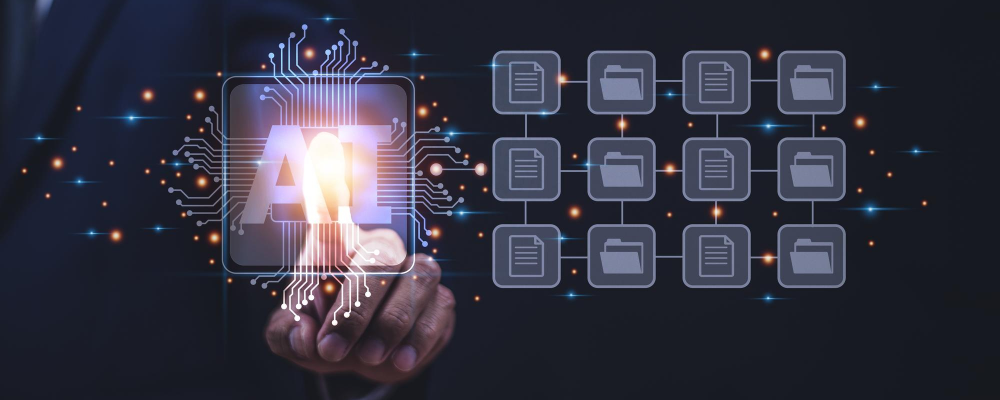

For years, AI in the enterprise has been associated with automation and efficiency—automating repetitive tasks, reducing costs, and streamlining operations. These are valuable gains, but they represent only the starting point. Today, the most successful companies are using AI not just to optimize their processes, but to differentiate themselves—by innovating faster, delivering more personalized experiences, and transforming the way they grow, compete, and lead.
AI is no longer just an IT tool. It’s a business strategy.
Traditionally, innovation in large companies has been constrained by long development cycles, limited access to insights, and the high cost of experimentation. AI is changing that.
For example, Moderna used AI to digitally model and simulate mRNA vaccine candidates during the early stages of the COVID-19 pandemic. What used to take months or years—molecule design, viability testing, and planning for trials—was condensed into days, enabling the company to become one of the fastest to enter clinical trials.
In the automotive industry, BMW is using generative design and AI-based simulations to speed up the creation of car components, improve safety testing, and reduce design iterations. This shortens development cycles and enables rapid customization based on customer needs.
Companies with strong data strategies are building durable competitive advantages by using AI to extract deeper insights and deliver more personalized experiences.
Spotify is a standout example. By collecting and analyzing massive amounts of user behavior data, Spotify’s recommendation engines can create hyper-personalized playlists like “Discover Weekly” and “Release Radar” for every individual listener. This level of personalization is nearly impossible to replicate without similar data depth and AI sophistication.
In agriculture, John Deere is using AI and sensor data to help farmers make more informed decisions about planting, irrigation, and pest control. Their autonomous machinery not only enhances efficiency but also provides ongoing insights, forming the basis of a new service-oriented business model.
AI also gives companies the ability to adapt rapidly to market changes and customer demand. Where traditional forecasting and planning models often lag, AI enables continuous scenario modeling and agile decision-making.
Unilever, for example, uses AI-driven demand sensing models that incorporate variables such as local events, weather forecasts, and sales promotions. This allows them to improve forecasting accuracy and reduce waste across global supply chains.
UPS uses an AI-based route optimization system called ORION, which analyzes real-time traffic data and parcel delivery information to create the most efficient routes. This system not only saves millions of gallons of fuel but also improves delivery times and customer satisfaction.
AI is transforming how companies attract, develop, and retain talent—not by replacing people, but by helping them grow.
In Human Resources, companies are using AI to identify skill gaps and deliver personalized learning paths. For example, IBM’s Watson Career Coach recommends training modules to employees based on their career goals, current role, and skill profile. This makes learning more relevant, timely, and aligned with both individual and organizational needs.
AI is also powering smarter mentorship matching. Platforms like InzpireU use AI to analyze profiles to pair mentors and mentees who are most likely to build productive, lasting relationships.
In performance management, AI tools help reduce unconscious bias by analyzing feedback patterns and promotion decisions. Companies like Accenture are integrating AI into their internal review processes to ensure fairer, more transparent career advancement.
AI is even helping organizations monitor employee engagement and retention risks by identifying early signals—such as declining communication, missed check-ins, or changes in team dynamics (e.g. graphio.ai). This enables proactive interventions rather than reactive HR action.
Across industries, AI is not replacing expertise—it is elevating it.
At Morgan Stanley, financial advisors use an AI tool called “Next Best Action,” which analyzes markets, portfolios, and client history to suggest tailored recommendations. This allows advisors to spend more time building relationships and less time analyzing data.
At Walmart, store associates use an AI assistant called Ask Sam to quickly locate items, answer customer queries, or check inventory—all in real time. The result is faster service, less frustration, and better customer experiences.If AI is still viewed primarily as an efficiency tool in your organization, it may be time to reframe the conversation. The most important strategic questions today are:
- How can AI help us deliver new products, services, or customer experiences that were previously out of reach?
- How can we use our data to build competitive differentiation?
- Are we using AI to empower our people—not just to reduce headcount, but to help them grow?
Companies that treat AI as a strategic driver—not just a digital assistant—are the ones creating lasting advantage.
AI is redefining what it means to be a high-performing organization. It’s moving beyond operational support into areas of creativity, agility, and leadership. The companies that succeed in the next decade will be those that ask not just how AI can make them more efficient—but how it can make them irreplaceable.
.png)

